Snapchat Addiction Lawsuits: What You Need to Know
- Last Updated: July 14th, 2025

Attorney Jessica Paluch-Hoerman, founder of TruLaw, has over 28 years of experience as a personal injury and mass tort attorney, and previously worked as an international tax attorney at Deloitte. Jessie collaborates with attorneys nationwide — enabling her to share reliable, up-to-date legal information with our readers.
Legally Reviewed
This article has been written and reviewed for legal accuracy and clarity by the team of writers and legal experts at TruLaw and is as accurate as possible. This content should not be taken as legal advice from an attorney. If you would like to learn more about our owner and experienced injury lawyer, Jessie Paluch, you can do so here.
Fact-Checked
TruLaw does everything possible to make sure the information in this article is up to date and accurate. If you need specific legal advice about your case, contact us by using the chat on the bottom of this page. This article should not be taken as advice from an attorney.
Key takeaways:
- As of May 2024, a total of 455 social media addiction lawsuits have been filed in the Social Media Adolescent Addiction/Personal Injury Products Liability Litigation (MDL 3047).
- High-profile cases like those involving Selena Rodriguez, M.K., Liam Heffner, and CJ Dawley underscore the potential consequences of excessive social media use.
- Snapchat faces scrutiny over features like disappearing messages and Snapstreaks that may enable drug dealers to evade responsibility, compel daily use among teens, and direct young users to potentially harmful content.
Overview of Snapchat Addiction Lawsuits
On this page, we’ll discuss Snapchat addiction lawsuits, the impact of Snapchat addiction on mental health, legal actions taken against Snapchat for promoting addictive behavior, and much more.
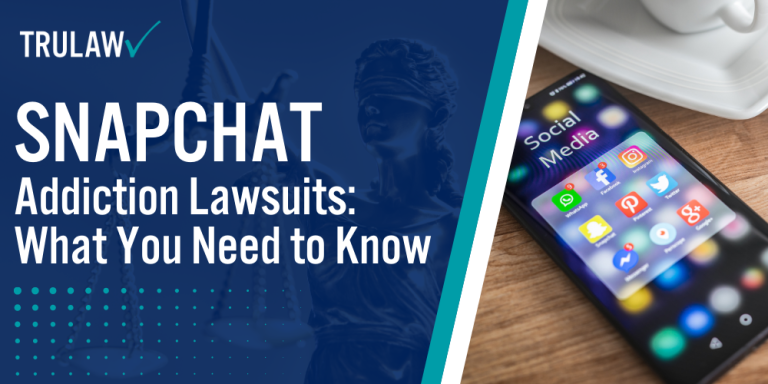
Intro to Snapchat Addiction Lawsuits
Some key aspects of these lawsuits include:
- Addictive Design Features: Accusations that Snapchat’s disappearing messages, streaks, and other features are engineered to encourage compulsive use.
- Inadequate Safeguards: Snapchat claims to have failed to implement sufficient measures to prevent addiction and protect vulnerable users.
- Mental Health Harms: Allegations that Snapchat addiction contributes to anxiety, depression, sleep disorders, and other psychological issues.
- Lack of Parental Controls: Assertions that Snapchat does not provide adequate tools for parents to monitor and limit their children’s use of the app.
If you or a loved one has suffered mental health issues due to Snapchat addiction, you may be eligible to seek compensation.
Contact TruLaw using the chat on this page for a free case evaluation to determine if you qualify to join a Snapchat addiction lawsuit.
Table of Contents
Snapchat Lawsuits Filed by Social Media Victims Law Center
Recent legal action has intensified around Snapchat as the Social Media Victims Law Center (SMVLC) takes a firm stance against what it claims are the platform’s detrimental effects on mental health, specifically targeting the app’s algorithms.
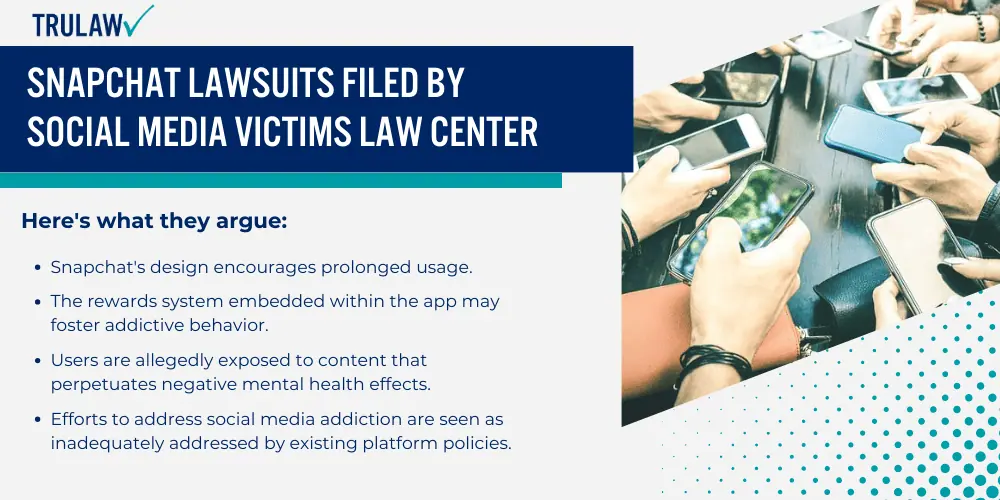
SMVLC Sues Snapchat for Algorithmic Discrimination
The Social Media Victims Law Center has filed a lawsuit accusing Snapchat of algorithmic discrimination.
This legal action asserts that Snapchat’s algorithms incentivize content that can lead to addiction and negatively impact users’ mental health.
Here’s what they argue:
- Snapchat’s design encourages prolonged usage.
- The rewards system embedded within the app may foster addictive behavior.
- Users are allegedly exposed to content that perpetuates negative mental health effects.
- Efforts to address social media addiction are seen as inadequately addressed by existing platform policies.
Highlighted Issues: The lawsuit presents a direct challenge to the mechanisms that drive user engagement on Snapchat.
Meta Platforms Also Named in Snapchat Lawsuits
Meta Platforms, the company behind Instagram, is facing lawsuits alongside Snapchat.
The Snapchat addiction lawsuits allege that both social media platforms have designed their products in ways that can be detrimental to users’ mental health.
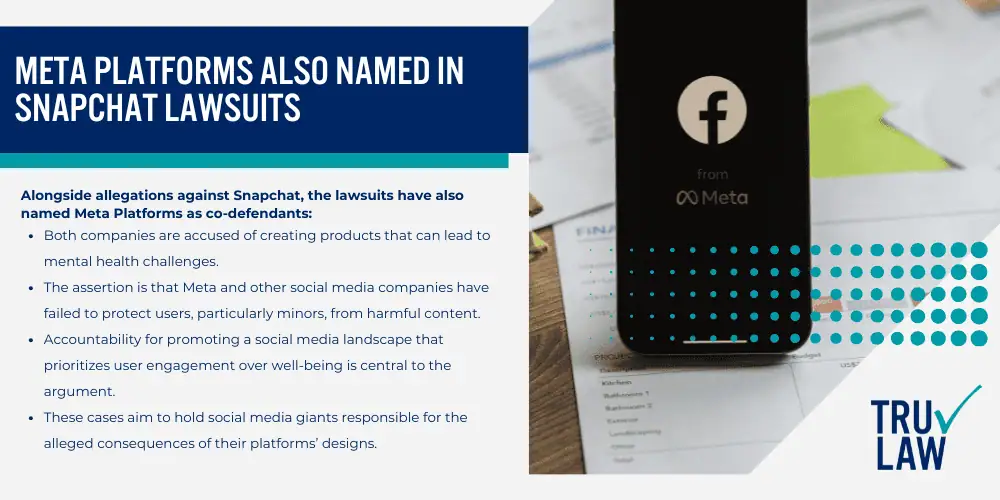
Alongside allegations against Snapchat, the lawsuits have also named Meta Platforms as co-defendants:
- Both companies are accused of creating products that can lead to mental health challenges.
- The assertion is that Meta and other social media companies have failed to protect users, particularly minors, from harmful content.
- Accountability for promoting a social media landscape that prioritizes user engagement over well-being is central to the argument.
- These cases aim to hold social media giants responsible for the alleged consequences of their platforms’ designs.
Key Focus: The litigation seeks to hold these major social media companies to account for their role in users’ lives.
Rodriguez v. Meta Platforms Inc. and Snap Inc. Lawsuit
This section explores the high-profile litigation case involving Selena Rodriguez, a teenager whose addiction to social media platforms, specifically Snapchat and Instagram, led to a lawsuit against Meta Platforms Inc. and Snap Inc.
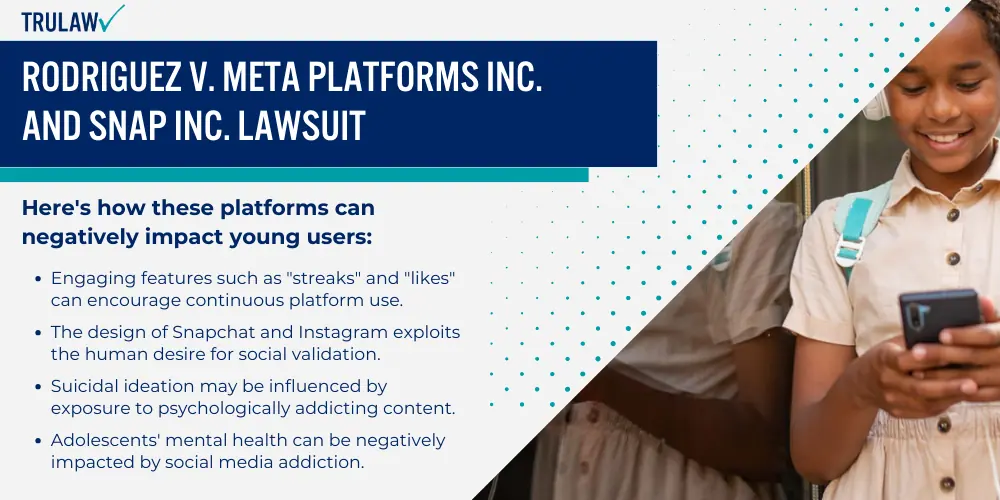
Selena Rodriguez’s Addiction to Snapchat and Instagram
Selena Rodriguez was an avid user of Snapchat and Instagram, where the platforms’ persuasive design elements kept young users like her engaged.
The youth mental health crisis has been linked in part to the heavy use of social media, which is designed to capture and retain attention.
Here’s how these platforms can negatively impact young users:
- Engaging features such as “streaks” and “likes” can encourage continuous platform use.
- The design of Snapchat and Instagram exploits the human desire for social validation.
- Suicidal ideation may be influenced by exposure to psychologically addicting content.
- Adolescents’ mental health can be negatively impacted by social media addiction.
Selena’s Tragic Suicide Linked to Social Media Addiction
The unbearable psychological impact of social media addiction was tragically highlighted in the case of Selena Rodriguez.
Her family attributes her decision to take her own life to the compulsive use of Snapchat and Instagram, platforms which they argue contributed to her mental health decline.
Social media’s design and relentless engagement may have played a role in Selena’s tragedy:
- Endless scrolling and instant feedback loops relentlessly pulled Selena’s attention.
- Young people’s mental health can be significantly affected by online interactions and dependencies.
- The social media addiction lawsuit alleges that the design principles of social media platforms can exacerbate mental health vulnerabilities.
- Uninterrupted social media use is cited as a contributing factor to her tragic outcome.
Doffing v. Meta Platforms Inc. and Snap Inc. Lawsuit
In a landmark case, the Doffing lawsuit alleges that addictive designs in social media apps contributed to severe mental health decline in a minor, known by the initials M.K.
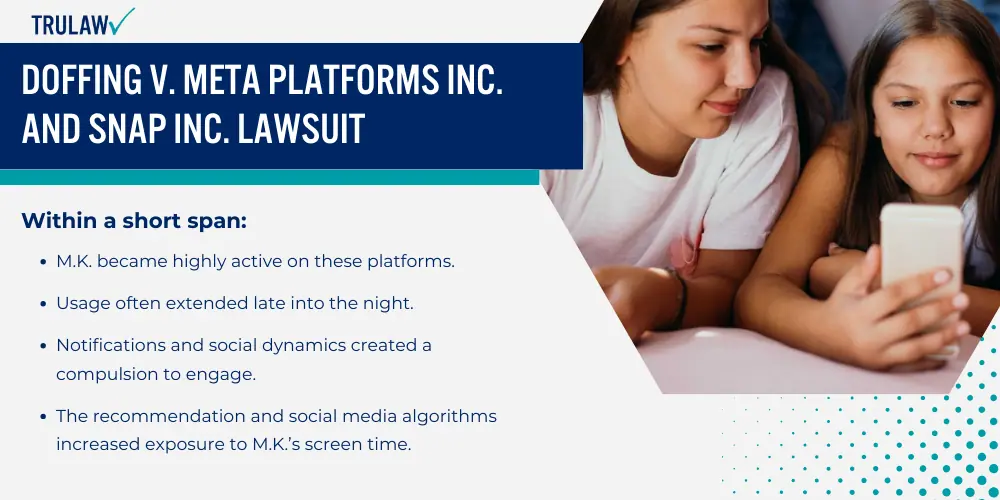
M.K.’s Rapid Addiction to Instagram and Snapchat
M.K.’s involvement with Instagram and Snapchat rapidly increased screen time and social media engagement.
Within a short span:
- M.K. became highly active on these platforms.
- Usage often extended late into the night.
- Notifications and social dynamics created a compulsion to engage.
- The recommendation and social media algorithms increased exposure to M.K.’s screen time.
This behavior escalated into what the lawsuit describes as addiction, with M.K. being unable to reduce or control social media use.
M.K.’s Mental Health Decline and Hospitalizations
M.K.’s experience illustrates the potential consequences of excessive social media use.
The constant activity is linked to a decline in M.K.’s mental well-being, including anxiety, depression and even hospitalizations due to mental health crises.
Consequent to the intense social media activity, M.K. experienced:
- Significant mental health challenges, including anxiety and depression.
- A documented decline in well-being correlates with increased social media use.
- Several instances of hospitalization due to mental health crises.
- A call to action for youth mental health programs that address the impact of social media on childhood mental health crisis.
Numerous Snapchat addiction lawsuits being filed emphasize the role of social media as a factor affecting users’, especially minors, mental health, suggesting that foreseeable risks were not adequately mitigated.
Heffner vs. Meta Platforms Inc. and Snap Inc. Lawsuit
In a high-profile legal confrontation, the family of Liam Heffner pursues justice against Meta Platforms Inc. and Snap Inc., alleging that the companies’ social media platforms contributed to Liam’s addiction and subsequent tragic death.
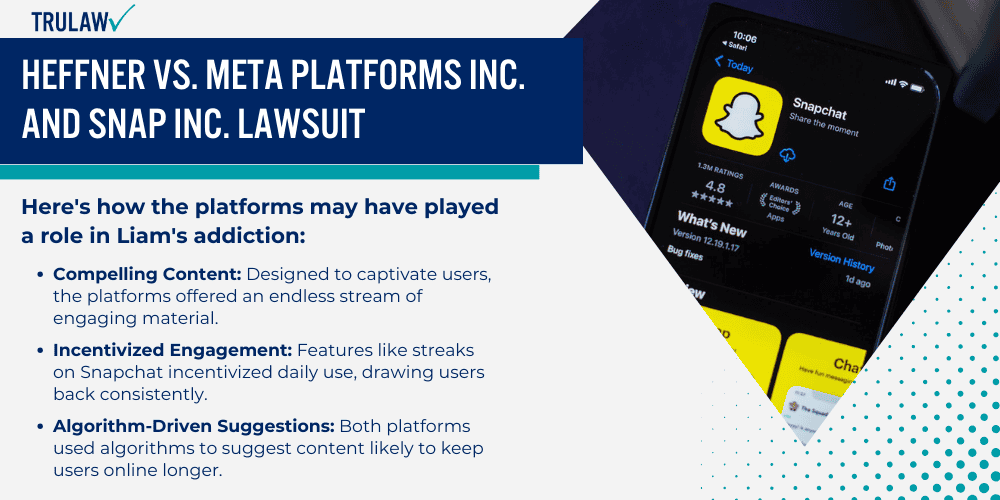
Liam Birchfield’s Snapchat and Instagram Addiction
Like many adolescent users, Liam Birchfield found himself deeply engrossed in the worlds of Snapchat and Instagram.
Documents from the Heffner vs. Meta Platforms Inc. and Snap Inc. lawsuits illustrate a pattern of excessive social media use.
Here’s how the platforms may have played a role in Liam’s addiction:
- Compelling Content: Designed to captivate users, the platforms offered an endless stream of engaging material.
- Incentivized Engagement: Features like streaks on Snapchat incentivized daily use, drawing users back consistently.
- Algorithm-Driven Suggestions: Both platforms used algorithms to suggest content likely to keep users online longer.
- Social Pressures: Platforms foster an environment where social interactions and validation are tied to user activity.
Liam’s Suicide by Gunshot Linked to Social Media Use
The tragic outcome of social media addiction is starkly highlighted in the case of Liam Heffner, whose life ended by suicide.
The lawsuit puts forth that:
- Addiction Consequences: Social media platforms, through their addictive design, may have significant mental health impacts on users.
- Isolation And Depression: Prolonged usage can lead to feelings of isolation, which were present in Liam’s case, according to the lawsuit’s allegations.
- A Call for Accountability: The Heffner family seeks to hold the social media giants accountable for neglecting the welfare of young users.
- Potential for Platform Reform: This lawsuit underscores the need to change how social media platforms engage with their youngest users.
Dawley vs. Meta Platforms Inc. and Snap Inc. Lawsuit
In a tragic turn of events, the Dawley family filed a lawsuit against Meta Platforms Inc. and Snap Inc., alleging that excessive use of social media platforms played a role in their son’s death.
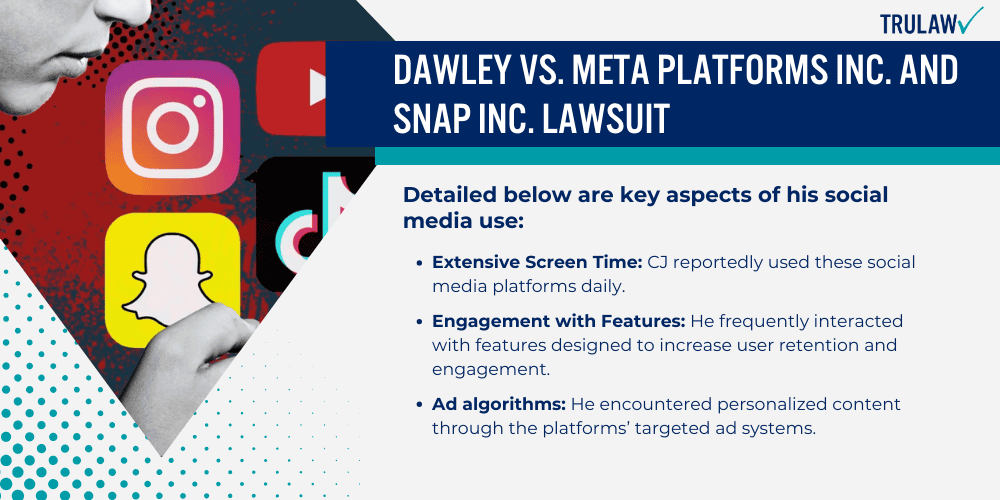
The case underscores the growing concerns surrounding the negative impact of prolonged engagement with these social media giants.
CJ Dawley’s Facebook, Instagram, and Snapchat Use
CJ Dawley was an avid user of Facebook, Instagram, and Snapchat.
His activity on these platforms is at the forefront of the litigation.
Detailed below are key aspects of his social media use:
- Extensive Screen Time: CJ reportedly used these social media platforms daily.
- Engagement with Features: He frequently interacted with features designed to increase user retention and engagement.
- Ad algorithms: He encountered personalized content through the platforms’ targeted ad systems.
- Notification Design: The platforms’ design to send frequent notifications played a role in securing CJ’s constant attention.
CJ’s Unexpected Suicide Leaves Parents Devastated
CJ Dawley’s parents are suffering unimaginable grief after his unexpected suicide.
They believe his constant social media use may have played a contributing role in his tragic death.
The ultimate consequence of CJ Dawley’s intense social media activity was heartrending:
- Impact: The uninterrupted exposure to these platforms is alleged to have had a severe impact on CJ’s mental health.
- Connection: A link is being drawn between his social media use and his drastic decision.
- Grief: The Dawley family is wrought with grief, seeking accountability for the tragedy they have faced.
- Legal Action: Their pursuit of legal justice is a sober reminder of the potential perils of social media.
Snapchat's Role in Fentanyl Deaths Under FBI Investigation
Snap Inc., the parent company of Snapchat, faces scrutiny as the FBI investigates the platform’s alleged connection to fentanyl-related tragedies.
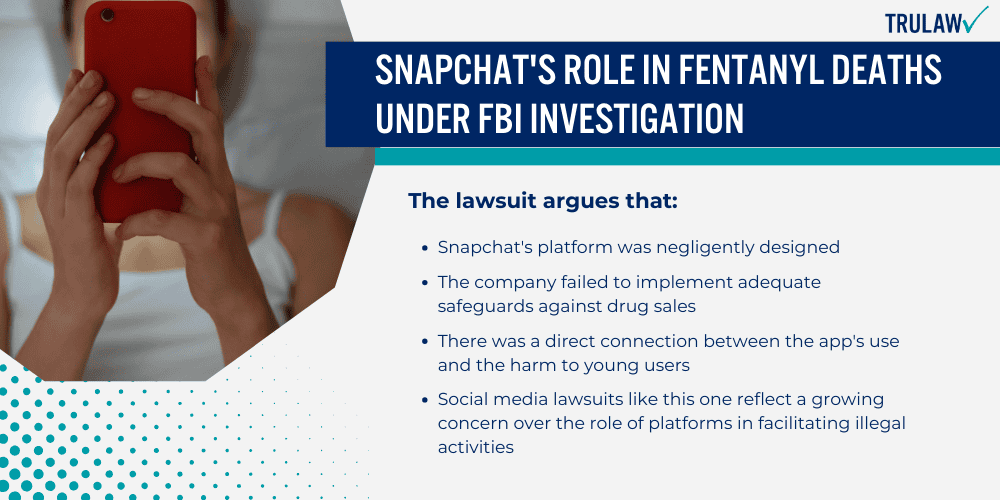
Snapchat’s Features Enable Drug Dealers to Evade Responsibility
Snapchat’s design has raised concerns due to features that may allow drug dealers to operate with a degree of anonymity.
- Disappearing messages
- Lack of robust user activity tracking
- User-friendly interface that doesn’t keep a public record
- The “Snap Map” feature potentially facilitates local drug exchanges
These aspects of Snapchat have made it difficult for law enforcement to track illicit activities.
SMVLC Files Separate Fentanyl Lawsuit Against Snap Inc.
The Social Media Victims Law Center (SMVLC) has taken legal action against Snap Inc.
They filed a lawsuit implicating the social media platform in cases of harm resulting from fentanyl sales.
The lawsuit argues that:
- Snapchat’s platform was negligently designed
- The company failed to implement adequate safeguards against drug sales
- There was a direct connection between the app’s use and the harm to young users
- Social media lawsuits like this one reflect a growing concern over the role of platforms in facilitating illegal activities
How Snapchat's Features Put Teens and Tweens at Risk
A popular social media platform, Snapchat is often scrutinized for its engaging features that may pose risks to its younger users.
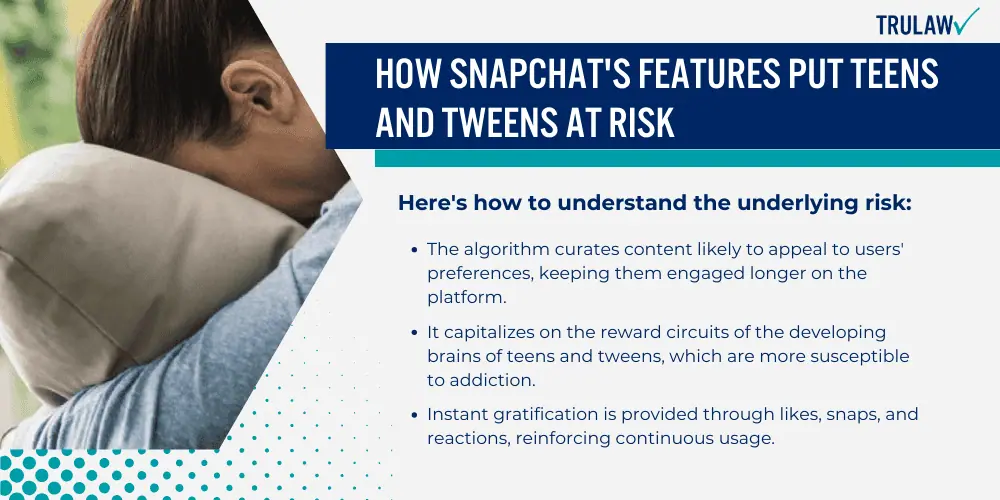
The platform’s blend of visual content sharing and instant feedback loops can potentially lead to problematic use among adolescents.
Addictive Algorithm Exploits Underdeveloped Brain Chemistry
Snapchat’s algorithms are designed to capture attention and increase engagement.
Here’s how to understand the underlying risk:
- The algorithm curates content likely to appeal to users’ preferences, keeping them engaged longer on the platform.
- It capitalizes on the reward circuits of the developing brains of teens and tweens, which are more susceptible to addiction.
- Instant gratification is provided through likes, snaps, and reactions, reinforcing continuous usage.
- Regular exposure to the app’s interactive features can lead to habit formation at an early stage.
Engagement-centric algorithms can foster an environment that nudges young users towards spending an escalating amount of time on the app.
Snapstreaks Compel Daily Use and Measure Friendships
Snapstreaks, a feature where sending snaps back and forth for consecutive days builds a streak, can turn social interaction into a daily obligation for teens.
These streaks become a public display of friendship length, creating pressure to maintain the streak and avoid letting it die, which some teens fear could damage the friendship.
Snapstreaks represent a specific feature that can drive constant interaction among teens:
- A Snapstreak occurs when two users have snapped at each other within 24 hours for consecutive days.
- They symbolize the length of ongoing communication, exerting pressure to maintain communication.
- There is a perception of Snapstreaks being a barometer for social standing and friendship strength.
- Losing a Snapstreak can evoke a fear of damaging a relationship, propelling daily use to avoid such an outcome.
Snapstreaks add a layer of transactional dynamics to friendships, which can be stressful for young users.
SMVLC Founder on Holding Snapchat Accountable for Harm
In response to the mounting concerns over Snapchat’s impact on youth, the Social Media Victims Law Center (SMVLC) is looking to hold the platform accountable.
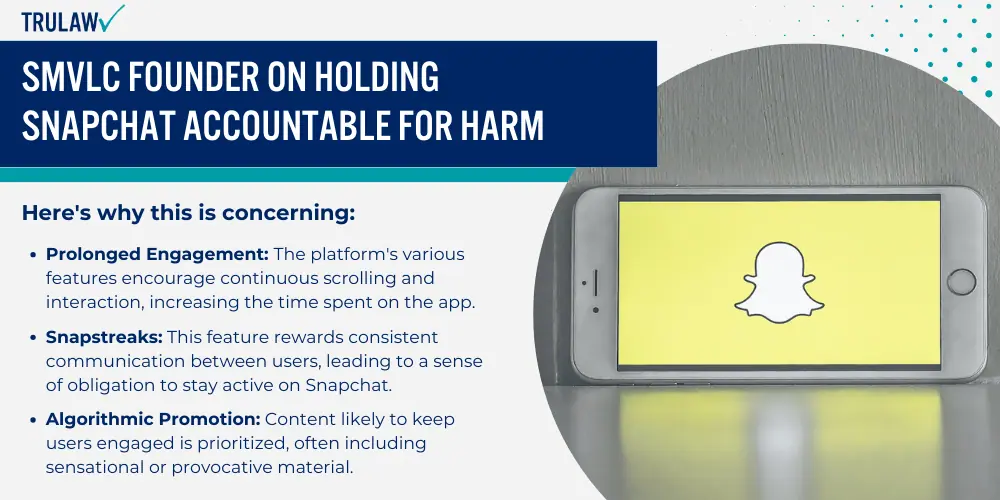
Snapchat’s Profit Model Based on Keeping Kids Online
Snapchat harnesses a profit model designed to keep users, especially kids, engaged for lengthy periods.
Here’s why this is concerning:
- Prolonged Engagement: The platform’s various features encourage continuous scrolling and interaction, increasing the time spent on the app.
- Snapstreaks: This feature rewards consistent communication between users, leading to a sense of obligation to stay active on Snapchat.
- Algorithmic Promotion: Content likely to keep users engaged is prioritized, often including sensational or provocative material.
- Financial Incentives: The longer users stay online, the more opportunities for Snapchat to display ads, generating revenue.
Snapchat Affirmatively Directs Kids to Harmful Information
The allegation that Snapchat guides kids toward damaging content underscores the critical need for accountability.
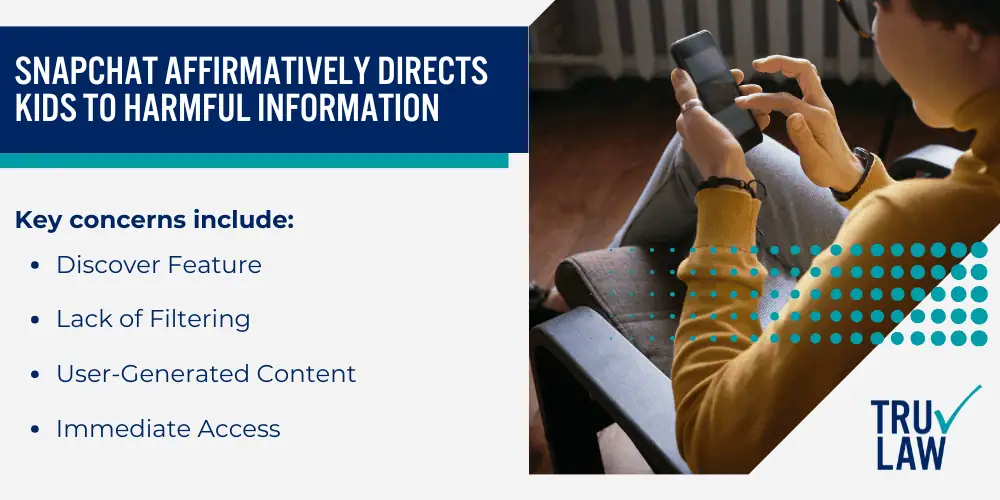
Key concerns include:
- Discover Feature: Users, regardless of age, are presented with content that may not be age-appropriate.
- Lack of Filtering: While some measures are in place, they are often insufficient to prevent exposure to detrimental information.
- User-Generated Content: The platform’s nature makes regulating and controlling the spread of potentially harmful user-generated content challenging.
- Immediate Access: The app’s instantaneous nature allows harmful content to reach vulnerable audiences rapidly, with little time for intervention.
Social Media Harm Lawsuits Frequently Asked Questions
-
Individuals have filed lawsuits against Snapchat because the platform’s design and features are allegedly causing addiction and psychological distress among users.
Legal actions have centered on claims that Snapchat did not sufficiently warn users about the risks of addiction.
-
To seek compensation in the Snapchat addiction lawsuits, individuals typically have to demonstrate that they have suffered measurable harm due to their use of the app.
This may include providing evidence of psychological impacts and any financial losses incurred as a result.
-
There are few legal precedents specifically for social media addiction.
However, similar cases, like personal injury lawsuits, have been filed alleging that companies’ products caused harm due to addictive properties.
-
To initiate a lawsuit against Snapchat, individuals should document their app use, gather evidence of any harm experienced, and consult a lawyer specializing in product liability or personal injury with experience in technology-related cases.
-
Several lawsuits have been filed in California, but as of this writing, definitive outcomes are still developing.
Court proceedings and legal actions are ongoing, highlighting the evolving nature of such cases.

Managing Attorney & Owner
With over 25 years of legal experience, Jessica Paluch-Hoerman is an Illinois lawyer, a CPA, and a mother of three. She spent the first decade of her career working as an international tax attorney at Deloitte.
In 2009, Jessie co-founded her own law firm with her husband – which has scaled to over 30 employees since its conception.
In 2016, Jessie founded TruLaw, which allows her to collaborate with attorneys and legal experts across the United States on a daily basis. This hypervaluable network of experts is what enables her to share the most reliable, accurate, and up-to-date legal information with our readers!
Additional Social Media Harm Lawsuits resources on our website:
Here, at TruLaw, we’re committed to helping victims get the justice they deserve.
Alongside our partner law firms, we have successfully collected over $3 Billion in verdicts and settlements on behalf of injured individuals.
Would you like our help?
At TruLaw, we fiercely combat corporations that endanger individuals’ well-being. If you’ve suffered injuries and believe these well-funded entities should be held accountable, we’re here for you.
With TruLaw, you gain access to successful and seasoned lawyers who maximize your chances of success. Our lawyers invest in you—they do not receive a dime until your lawsuit reaches a successful resolution!
AFFF Lawsuit claims are being filed against manufacturers of aqueous film-forming foam (AFFF), commonly used in firefighting.
Claims allege that companies such as 3M, DuPont, and Tyco Fire Products failed to adequately warn users about the potential dangers of AFFF exposure — including increased risks of various cancers and diseases.
Depo Provera Lawsuit claims are being filed by individuals who allege they developed meningioma (a type of brain tumor) after receiving Depo-Provera birth control injections.
A 2024 study found that women using Depo-Provera for at least 1 year are five times more likely to develop meningioma brain tumors compared to those not using the drug.
Suboxone Tooth Decay Lawsuit claims are being filed against Indivior, the manufacturer of Suboxone, a medication used to treat opioid addiction.
Claims allege that Indivior failed to adequately warn users about the potential dangers of severe tooth decay and dental injuries associated with Suboxone’s sublingual film version.
Social Media Harm Lawsuits are being filed against social media companies for allegedly causing mental health issues in children and teens.
Claims allege that companies like Meta, Google, ByteDance, and Snap designed addictive platforms that led to anxiety, depression, and other mental health issues without adequately warning users or parents.
Transvaginal Mesh Lawsuits are being filed against manufacturers of transvaginal mesh products used to treat pelvic organ prolapse (POP) and stress urinary incontinence (SUI).
Claims allege that companies like Ethicon, C.R. Bard, and Boston Scientific failed to adequately warn about potential dangers — including erosion, pain, and infection.
Bair Hugger Warming Blanket Lawsuits involve claims against 3M — alleging their surgical warming blankets caused severe infections and complications (particularly in hip and knee replacement surgeries).
Plaintiffs claim 3M failed to warn about potential risks — despite knowing about increased risk of deep joint infections since 2011.
Baby Formula NEC Lawsuit claims are being filed against manufacturers of cow’s milk-based baby formula products.
Claims allege that companies like Abbott Laboratories (Similac) and Mead Johnson & Company (Enfamil) failed to warn about the increased risk of necrotizing enterocolitis (NEC) in premature infants.
Here, at TruLaw, we’re committed to helping victims get the justice they deserve.
Alongside our partner law firms, we have successfully collected over $3 Billion in verdicts and settlements on behalf of injured individuals.
Would you like our help?
